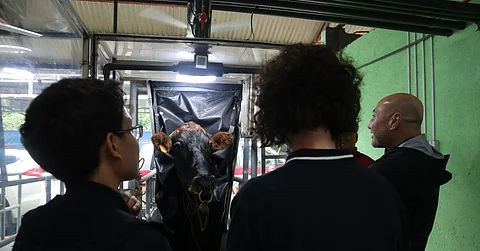
- NEWS
- the EDIT
- COMMENTARY
- BUSINESS
- LIFE
- SHOW
- ACTION
- GLOBAL GOALS
- SNAPS
- DYARYO TIRADA
- MORE

You can’t mitigate what you don’t measure.
This slogan of the Climate Smart Agriculture (CSA) Initiative of New Zealand (NZ) sums up the rationale of the organization and why it helps other countries account for their agriculture industry’s greenhouse gas (GHG) emission to come up with corresponding mitigation measures.
Under the initiative, the Kiwi government is supporting the development of CSA in the Philippines by funding its GHG inventories for livestock conducted by the University of the Philippines-Los Baños’ (UPLB) Dairy Training and Research Institute (DTRI) and the Philippine Carabao Center (PCC). The New Zealand Ministry for Primary Industries and the NZ Greenhouse Gas Research Centre (NZAGRC) provide the funds for improving the livestock feed characterization and GHG estimation facilities for buffalo, including for a gas analyzer. NZ’s investment for the Philippine program is over NZ$1.6 million (P55.4 million).
“The long-term objective of this collaboration is to enable the PCC and UPLB to identify, plan and implement measures aligned with national objectives for livestock development and GHG mitigation, as outlined in the Philippines’ Nationally Determined Contributions. Through this research, the program will ultimately identify practical mitigation options,” according to the NZ Embassy in the Philippines.
Last 26 to 27 August, officials from the embassy, NZ Ministry for Primary Industries and NZAGRC visited the DTRI in UPLB to see the progress of NZ-funded ASEAN CSA initiative. Both sides also discussed the progress of the CSA project and the broader implications for livestock development and emission mitigation strategies in the Philippines.
Accordingly, the delegation also toured DTRI Farm and its Headbox Respiration Facility.
NZ Ambassador Catherine McIntosh, who led the foreign delegation, congratulated the local team for the exciting potential impact of their research.
“By creating a clearer picture of agricultural GHG emissions, they are also able to look at different approaches to mitigate these emissions. If applied widely in the Philippines, this will make the agriculture sector more efficient in addressing climate change,” said McIntosh.
In the Philippines, agriculture makes up about 9 percent of the country’s economy, and ruminant livestock contributes to a significant proportion of agricultural emissions. The ASEAN CSA project is working on more accurate ways to measure these emissions through improving the GHG inventory for livestock. This shift from basic to more precise methods is instrumental for the Philippines to reach its climate goals, which include cutting GHG emissions by 75 percent by 2030, as part of its commitment to the Paris Agreement.
